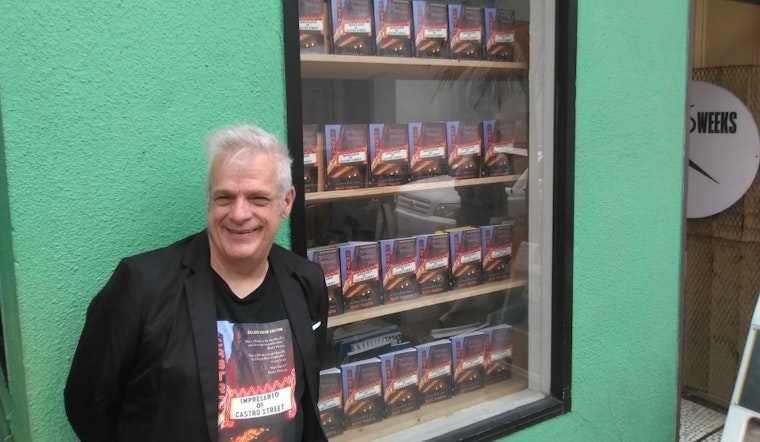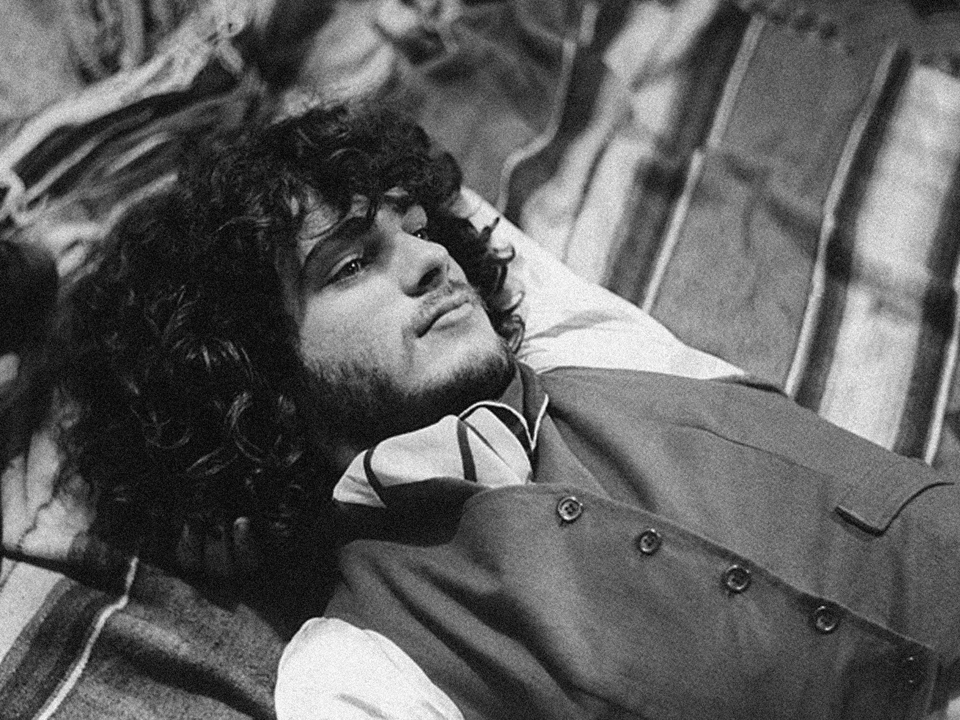
For decades, filmmaker Marc Huestis has been a neighborhood fixture in the Castro. He's directed several short and feature documentaries ("Sex Is...," "Chuck Solomon: Coming of Age"), but he's perhaps best known for his two decades of hosting Hollywood tribute extravaganzas at the Castro Theater.
Now, he's written a memoir about his long and varied life and career, and how he overcame an abusive childhood and struggles with addiction to find community and a following in the Castro.
While "Impresario of Castro Street" is billed as an "intimate showbiz memoir," Huestis — who began writing it after a foot injury left him bedridden for several months — said he wanted to create something more impactful than a light, frothy memoir.
"I really wanted to talk about who I was as a person and deal with my demons," he said. "I take myself to task."

Huestis first moved to San Francisco in the 1970s. After moving to the Haight, he began performing with avant-garde theater troupe Angels of Light.
"You could live on $50 a month," he recalls. "It was crazy. All of us were in collectives or communes and pooled our money. We'd have self-criticism meetings, we'd learn new skills — I learned how to bake bread. When I was with Angels of Light, I learned how to tap-dance and to create costumes. Everyone was learning from each other. The sense of creativity was overflowing."
After working with the troupe, Huestis began to develop an interest in making short experimental films. He would have his film processed at Harvey Milk's famed Castro Camera (575 Castro St.), and he and other filmmakers began screening their work at do-it-yourself film festivals, sometimes projecting the films on a bedsheet. Those screenings eventually led to the formation of Frameline, the first and largest LGBTQ+ film festival in the world.
"Who knew that when a group of ragtag hippie queers came together in 1977 to show their little Super 8 films, it would become the oldest and largest LGBT film festival in the world?" he said.

Huestis' memoir captures the emergence of an out LGBT community in a city of free love, as well as the political activism of the era.
Much of that activism was expressed through his feature documentaries. His film about Chuck Solomon, a gay theater director living with HIV/AIDS, was one of the first films on the crisis to be made from an LGBT perspective.
Huestis is himself a long-term HIV survivor, having been diagnosed in 1985. While he looks back with sorrow on the many gay men who died of AIDS in the 1980s and 1990s, he also recalls it as a time of profound unity.
"We all took care of each other," he said. "It's not a cliche to say that there was a lot of love around. When you see your friends dying, you can either run away, or have a great deal of compassion and help out."
Huestis' memoir holds nothing back, with personal stories of his HIV diagnosis and his somewhat abusive childhood. His parents divorced when he was 12; his father was an alcoholic, and his mother worked as a stripper for many years. He's equally honest about his onetime addiction to crystal meth, having quit drugs for good in 2007
"Those chapters were written sporadically," Huestis said. "I would write for three days, and I'd be exhausted afterwards and then sleep for two days."
But though he's honest about his difficulties, he also has plenty of Hollywood gossip to share — much of it derived from his second career of producing tribute shows at the Castro, which began in 1995.

Over the years, Huestis brought dozens of stars to the Castro stage to screen and discuss their most classic films, including Kim Novak, Tony Curtis and Patty Duke.
But he decided to retire from producing in 2016, after the crowds started to dwindle and it became increasingly difficult to find stars willing to appear, though he did return for a showing of Alfred Hitchcock's classic Vertigo in 2018 after star Kim Novak's people asked him if he could do a show.
"We had a good time," Huestis said of the stars he brought to the Castro. "Some of them have become friends to this day. I've met a lot of great people — most of the stars that I've had, I've liked."

Huestis said he wrote "Impresario of Castro Street" in part to capture a San Francisco that no longer exists: a city of cheap rents, which had few issues with homelessness and attracted all kinds of artists to create and display their work. These days, he says, that sense of community is gone.
"Everywhere you went you'd run into someone that, even if you didn't know them, was a like spirit," he said. "I was around a lot of creative people, so there was a lot of happiness. We existed on nothing, spit and polish for our shows, but there wasn't this sense of struggle. I can't even imagine being an artist now and moving here, just because of the financial thing."
Huestis recalled that he enjoyed San Francisco when there was an "outsider" mentality to it.
"It used to be fun to be gay when it was kind of forbidden," he said. "It was forbidden fruit. I'm not saying we should go back to those days, but I got a lot out of that. Nowadays, when you walk down Castro Street, there's either crazy people or people with their baby strollers."
Now that the book has been published, Huestis is settling into a contented retirement. He says that he doesn't miss doing his Castro Theater shows, and is ready to spend his days at his cabin in the country.
"I never felt I was a writer — except being a whiz at writing press releases for my events," he said. "Doing this book challenged me to find a new voice and put it into words. And now it is my legacy, and will last forever."
He added that writing the book taught him new skills.
"When I open it up and read a page, I have a sense of accomplishment and wonder. I say to myself, 'I wrote that?' Life is good."
"Impresario of Castro Street" is now available at Dog Eared Books (489 Castro St.) and on Amazon.









